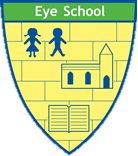Science
A chance to explore our universe...
Ask a question... Explore that question with a hands-on enquiry... Discover a big idea!
Our definition of Science:
Science is a way to understand our world by carefully thinking about it and testing our guesses with observations and experiments.
Our aim
At Eye, we have a distinct vision for the best way to learn about science. We believe that science is an opportunity to explore the world and to acquire the powerful knowledge that underpins an understanding of our universe. We believe every child should have regular opportunities to undertake hands-on enquiries to develop their ability to think and investigate like a scientist. We learn that everyday questions are often linked to the greatest discoveries in science and this helps us to appreciate the majestic world in which we live.
We want Science education to inspire a lifelong curiosity and passion for the subject, developing pupils' scientific knowledge and skills in a structured and progressive manner. We aim to provide a broad, balanced, and ambitious Science curriculum that is accessible to all pupils, regardless of their background or abilities. Our curriculum is designed to foster an understanding of the world around us, encourage critical thinking, and prepare children for the challenges of an increasingly scientific and technological society.
How do we teach it?
In science, we teach through a combination of knowledge and enquiry-based lessons. In a knowledge lesson, we learn and discover key scientific concepts. In an enquiry-based lesson, we will pose a question, seek to answer it and then link our findings to big ideas of science and key scientific concepts.
What does this look like in practice? Here's an example from year 5:
Small question: My friend says that she is going to jump from an aeroplane high in the sky. She has told me not to worry as she will be fine and will land safe and sound. How can this be true?
Enquiry: Year 5 investigated how different objects fall at different speeds and why. After learning that weight (the pull from gravity) pulled an object towards Earth and that air resistance slowed moving objects as they bumped into air particles, the children investigated this by creating parachutes of different sizes to slow falling objects.
Big Idea: From discussion with their teachers and subsequent enquiries and write-ups, year 5 reinforced their understanding of the following big ideas of science:
+ Weight (caused by gravity) and air resistance are forces that follow universal rules.
+ Air is made up of tiny building blocks.
The Big Ideas of Science
Physics
The universe follows unbreakable rules that are all about forces, matter and energy. Forces are different kinds of pushes and pulls that act on all the matter that is in the universe. Matter is all the stuff, or mass, in the universe. Energy, which cannot be created or destroyed, comes in many different forms and tends to move away from objects that have lots of it.
Chemistry
All matter (stuff) in the universe is made up of tiny building blocks. The arrangement, movement and type of these building blocks and the forces that hold them together or push them apart explain all the properties of matter (e.g. hot/cold, soft/hard, light/heavy, etc). Matter can change if the arrangement of these building blocks changes.
Biology
Living things are special collections of matter that make copies of themselves, use energy and grow. Living things on Earth come in a huge variety of different forms that are all related because they all came from the same starting point 4.5 billion years ago. The different kinds of life, animals, plants and microorganisms have evolved over countless generations into different forms in order to survive in the environments in which they live.
Earth Science
The Earth is one of eight planets that orbit the sun. The Earth is tilted and spins on its axis, leading to day and night, the seasons and the climate. The Earth is made up of several layers, including a relatively thin rocky surface which is divided into tectonic plates. The movement of these plates leads to many geologic events (such as earthquakes and volcanoes) and geographical features (such as mountains.) The Earth is surrounded by a layer of gases known as the atmosphere. This atmosphere can be disturbed by human activity, leading to potentially disastrous global warming.
Alignment with our vision and values
Science aligns with our school vision of "living life in all its fullness" (John 10:10) by fostering curiosity, wonder, and a deeper understanding of the world. Through science, pupils explore the intricacies of creation, appreciating the complexity and beauty of the natural world. This exploration encourages a sense of awe and reverence, which nurtures their spirituality and connection to a higher purpose.
By engaging with scientific concepts, students are encouraged to ask big questions about life, the universe, and their place within it, reflecting on how these discoveries relate to their faith and values. Science lessons promote critical thinking and problem-solving, empowering students to live fully and meaningfully by equipping them with the skills to navigate and contribute to the world thoughtfully.
Additionally, science education helps pupils recognise the importance of stewardship and caring for the Earth, aligning with Christian value of compassion and GROW standards. By understanding how the world works, students are inspired to make informed choices that contribute to the well-being of all creation, fulfilling their potential and living out the school's vision of a life lived fully in harmony with God's creation.
